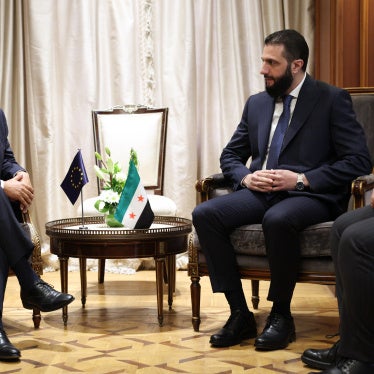Within hours, Russian media headlines blared that Ukraine’s “fascist” government was going on a rampage of abuse. One journalist from a mainstream Russian outlet asked us, “How can something so barbaric take place in the civilized world?” A member of the Russian parliament said he used the fact that we did not criticize the derogation as grounds to urge the prosecutor’s office to recognise Human Rights Watch as an “undesirable” organization.
Let’s start with the facts. Ukraine is not “cancelling” human rights or refusing to comply with its human rights obligations under the International Covenant on Civil and Political Rights (ICCPR) and the European Convention on the Protection of Human Rights and Fundamental Freedoms (ECHR). It can’t do that, unless it withdraws from the Council of Europe and the ICCPR. Nor is this a carte blanche for rights abuse. “Derogation” from certain human rights obligations is in fact a practice both treaties allow states to do – just read article 15 of the ECHR and article 4 of the ICCPR. These articles allow states to limit certain rights during emergency situations, including an armed conflict. But the treaties also require any restrictions be necessary, proportionate and non-discriminatory.
Most importantly, certain rights, such as the right to life, freedom from slavery, and discrimination are nonderogable and the prohibition against torture is absolute.
Ukraine is not the first state to derogate – the UK, Turkey, and Greece have derogated in the context of armed conflict or a state of emergency.
Certain aspects of the resolution passed by Ukraine are problematic. For instance, the determination that Russia is now responsible for human rights obligations in parts of Ukraine it “occupies” is one that the international bodies which supervise the treaties must make, not Ukraine. Also, the provision allowing authorities to detain terrorism suspects for 30 days without judicial review is not acceptable. European Court case law precedents show that, even with a derogation, anything longer than five days could constitute a violation.
For sure, all the restrictions placed on rights in the name of the derogation will need to be closely monitored, and there are important and serious human rights concerns that need addressing in Ukraine, including Ukraine’s conduct in armed conflict in the east.
But distorted media coverage only harms efforts to address these concerns and is damaging to people on the ground. Imagine, for example, a reaction of any Ukrainian in Donetsk hearing on television that his or her country will no longer respect their rights. Sloppy, aggressive, no-nuance reporting only serves to further fan the flames of this conflict.








